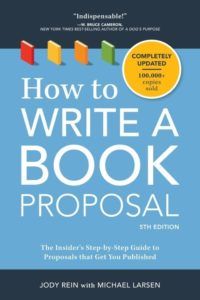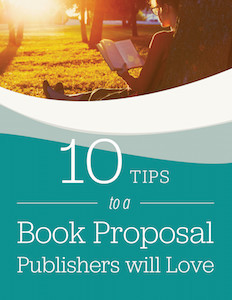
Today’s post was prompted by Maria who sent me this question: “Who do I send my proposal out to?” Agents? Publishers? Which ones? And how? Common questions with several nuances and steps.
If you’re new to publishing, how on earth do you figure out who to send your book proposal to? And who do you start with–agents or publishers?
Note: This article was updated June 2020 to include up-to-date information.
Do you send your book proposal to an agent or publisher?
If you’re interested in a trade press (larger markets, non-academic), particularly one of the larger publishers like Harper Collins, Random House, Hay House, etc., you’ll most likely need a literary agent. Yet, if your book is for a smaller, niche audience or academic audience, you may need to query publishers directly. If your market or platform is modest, there may not be enough potential advance and royalties to make the investment in time pay off for a literary agent. Yet, your book may have what a publisher is looking for.
Steps to Get a Literary Agent

Step 1: Write a Killer Book Proposal (I recommend Mike Larsen’s How to Write a Book Proposal–make sure it’s the most recent edition). You may well want to hire a book proposal coach or editor to make sure you write a compelling one.
Step 2: Identify Agents by:
a. Looking for books for a similar audience to yours and seeing who their agent was (check the acknowledgements section or search online. Publishers Marketplace offers information on book deals, including agent names and the size of the deal).
b. Searching AgentQuery.com
c. Attending writing conferences, particularly ones that have agent panels. The International Women’s Writing Guild has an excellent meet-the-agents panel at their Big Apple Conference each year. For those focusing on writing for health, wellness or medicine, Harvard Medical School’s CME publishing course has many top agents that you can meet in person and speak with in depth about your book and for advice. If they’re not the right agent, they may know of someone who is.
d. Working with a book proposal coach or editor who works with the type of agents you are looking for. They may be able to advise you or even introduce you to prospective agents, something I often do for my book proposal clients.
Step 3: Send a Great Query Letter to those agents you identified (or if you meet them in person and they request your proposal, you can skip this step). I recommend sending to 3-4 agents at first. That way, if you get feedback about the proposal, you can rewrite and send to new people on your list–so you haven’t eliminated all your top choices in your first try. Even experts sometimes find that their pitch is off and they need to rethink their book.
Step 4: Once an agent expresses interest, send your proposal. Make sure you send in the format they request on their website (e-mail or hard copy). Almost all proposals are by email nowadays. Your subject line should read something like, “Requested Book Proposal for __________” and in the email indicate something that will remind the agent about your book, such as title and where you met.
Step 5: Wait. You may contact the agent to make sure they received your proposal, but do not bug them.
How to Pick Your Literary Agent

If you get a yes, here are some questions to ask an agent so you can make a sound decision. If no, see if you can get some constructive feedback on why not. Incorporate the feedback to make your proposal (and/or book concept) stronger. Try several more agents. Keep at it. It often takes persistence. If you can afford it, I highly recommend hiring a book proposal coach–it will help you make your proposal that much better.
One more tip: often, if you’re getting no’s on a sound proposal, it can be that you need to develop a larger platform or reach–through blogging, podcasting, social media, online publicity, TV interviews, radio interviews, public speaking, offering webinars and other training. Ask agents if “platform” is the issue and then start working on it, if it is.



This is a great and really informative post Lisa! I have another question for you – do you have any tips on NEGOTIATING – like what should you expect to receive for your work and also what the details might be of any deal you might strike with an agent?
Great tips Lisa! Writing a great proposal is so important. But a proposal only goes so far. At the end of the day, you still have to do your homework and attend conferences.
And of course, keep sending out the query letters. I have a perfectionist personality (NOT good!) and often I want to live and die by one query letter.
So I have to realize that some of it is just a numbers game. Just getting query letters out there on a consistent basis counts for a lot and is important too.
Lisa, great content about writing a book proposal. Many of my clients are planning on writing books (and some are in the middle of them) and I plan on sharing your blog with them.
Lisa, your tips are clear and to the point. A new comer, to the writing books and getting them published world, can’t go wrong following these easy steps.
I appreciate the resources you have posted here. What is most people do not realize is that even though you sign with a large publishing house, many business writers have to do most of the publicity themselves anyway. So having an literary agent who can help you get the message out there is essential to a book’s success.
Yes, Dianne, That is true about almost any publishing house nowadays, although some will do some promotion–especially if they provide the author with a large advance. A literary agent is very important for negotiating the best deal and protecting your interests, and also finding you the best match for your book. However, they rarely promote your book or get the message out there either. That’s usually up to the author. Many authors hire a publicist. I have an upcoming free teleseminar with Eli Davidson where Eli will share authors can get their own PR as an alternative.
Thanks for this great information Lisa!
Amethyst, I’m not sure how I missed your questions, but I did. An agent usually gets 15% of your royalties, including advance. If you bring in the publisher, you can sometimes negotiate for 10%. They will ask more for selling foreign rights because they generally have to pay a foreign rights agent. It is often a good idea to have a lawyer look over the contract, but they do tend to be similar. Generally, the agent has exclusive rights to market your work for two years or so. The agent is paid by the publisher and the agents pays you so make sure the agent is reputable (you can check preditors and editors for that online and also do a google search).
Thanks Lisa – Appreciate your thoroughness and how informative you are! Do you ever help people find agents too?
Yes, generally I do that when I’ve worked with a client on their book proposal. I’ll then help them identify agents and I’ll e-mail or phone agents I have a relationship with who are a good fit.
This is great information to have, Lisa, even though I’m focusing on professional markets rather than trade. Maybe after some of us have success with professional markets we’ll be able to add tips for that avenue.
This is terrific Lisa. I hadn’t seen a list like this before. You make it look so easy to get your proposal out.
Judy, that would be great to have your tips! Debra, people often find the process overwhelming because they don’t quite know where to start. If you address it step-by-step it is easier.
Hi Lisa,
Great tips – as always. I have a couple of questions about the need to get permission to use short inspirational quotes – like some do at the beginning of chapters. If you include the author’s name do you need to do anything further? How about thanking supporters in your acknowledgements? Do you need to get their permission to put their name in the list of those you are thanking?
Thanks, Lisa
Susan
Susan, I”m so sorry I didn’t see this sooner. For short quotes you should not need permission. Just give the person’s name in the quote and then the actual source (suggest as book title) in a references section at the end of the book. Use the Chicago Manual of Style to see exactly how to list references. You do not need to get permission to thank people in your acknowledgements.
I think making the book(all about the publish biz,and nothing else, is a waste of time.I DON’T HAVE MOOLAH TO PUBLISH–SEE–Dont wanta be Mr.Gaines editor of mad magazine.-
-I’m not a publisher, that’s not MY GAME I AM BAD AT COURTING MONEY AND BIZ.–I always tell the publisher’s wife to go make me more martinis.–and then yell at her,”What kind of host are you?>!)”cause she’s too slow. Yeah, I still have a bad temper.Blame word press cause I blog there.
I can tell you have a strong voice as a writer–that’s a good sign!